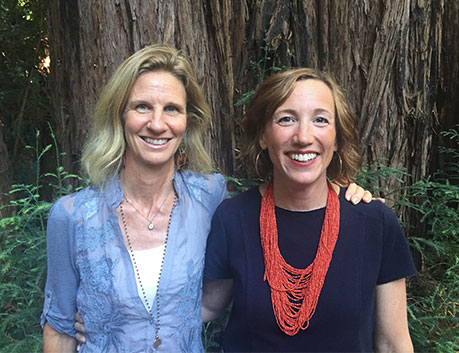Susie:
In the summer of 2016, when I received some horrible news about my health, I sent my family camping and sat on my bed for two days, spinning in thoughts of despair and sorrow. “I’m going to die and never see my children grow up. I’ll never write a book. We’ll go broke.”
After 48 hours of fighting like Muhammad Ali against my diagnosis, I did something radical. I asked, “What if I accept my situation? What would that feel like?” It felt TERRIBLE at first. My thoughts rushed in to yell at me, “You’re going to give up? You’re so weak!”
So I tried something new. I meditated on each of my thoughts and realized that what was causing me suffering was not the tumor that I could not feel in my body. Instead, my thoughts about the tumor were killing me, even before I spoke to a specialist. I needed to stop blindly believing everything I was thinking. I was going to have enough real physical pain to deal with; I didn’t need to make it worse with my thinking!
Then, something strange happened: I noticed that there was no difference between the thought “I’m going to die young,” and “I’m going to come out of this better than before” except for the way those thoughts made me feel. The relief I felt when I recognized this truth was enormous. I felt big, light, and free. I even laughed.
The minute I laughed at my most desperate thoughts, they lost their hold on me and seemed to disappear. It was as if they knew the gig was up, and moved on to someone else: “C’mon guys, let’s go bug another middle-aged woman who believes us.” Accepting my situation, while questioning my thoughts before letting them go, was making enough space in my head for wisdom.
Wisdom said, “No matter how bad your diagnosis, you still have a choice. You can spin and believe the stories that fill you with panic and despair. Or you can choose to see them not as reality, but just as stories.” I wrote down eight words in my journal: I choose joy over fear, brave over perfect.
What does it mean to be “brave over perfect”? To me it means radically accepting myself and things as they are, and moving forward anyway. I am discovering that the world is far friendlier without my scary thoughts driving the bus. I procrastinate less and take more risks. I don’t need to please others as much anymore. I write and post my work publicly. I’ve gone from believing that my writing is not worthy of an audience to feeling, Oh well. It is good enough.
I, too, feel good enough for the world. I say no without guilt. For example, I just said no to a party that we go to every year. I called my friend to tell her honestly, “I love your family. I’m sorry I won’t be there. Sunday is my best writing day.” My friend laughed and surprised me by saying, “Good for you. Let’s go for a walk later instead.”
The best news? I feel freer and happier now than I did before my diagnosis.
* * * * *
Christine:
I wake up at 3am as the wind roars outside, rattling windows, pelting the house with pine needles and seed pods from the trees. I feel panic; hot, dry winds like these started the recent Northern California wildfires. Have we prepared enough for an emergency evacuation?
Less than a week into the horrific wildfires near our home, I had to leave town for work. The fires raged only a few miles away. Evacuees and their pets filled our house. People we knew were losing their homes left and right.
To make myself feel better, I typed up three pages of detailed instructions for what my family should do in case of fire or earthquake. Everyone in my family knew that the unspoken title of this little manual was “Memorize This in Case Mom’s Not Here to Tell You Precisely What to Do in an Emergency.”
I further tried to soothe my anxiety about leaving home in the middle of a natural disaster by making my family practice an emergency evacuation. Tanner volunteered to take care of the family heirlooms. I drilled him, dead serious: “Which are the high priority photo albums?” Macie, who shares my ever-present desire to control everything, asked clarifying questions about our family meeting place.
Molly was drawing on her ankle with a ballpoint pen. “Molly! Pay attention! When you get Buster into the car, what else do you need to make sure you have with you?”
My husband rolled his eyes.
Now, two weeks later, I am lying in bed in the middle of the night, again away from home. This time I am with my family in hot and dusty Ojai, California. The dry winds howl against the house. I know fire is an always-present danger. I try not to imagine the hills around us bursting into flames.
And then I slowly realize: Oh. My. God. No one is home to execute my detailed evacuation plan in case of fire. We would be safe, but like so many families we know, we would lose absolutely everything, the carefully crafted (and now laminated) emergency plan included.
Until recently, I’d thought that I’d more or less conquered perfectionism. Perfectionism, I’d become fond of saying, is a particular form of unhappiness. Thank GOD I’m not a perfectionist anymore.
Hah.
While it is true that I am no longer as afraid of making a mistake or disappointing others as I was in my youth, I have obviously not yet rid my life of perfectionism. I’ve just turned it outward, to the world, and especially to others.
Every time I try to control anything other than my own thoughts–the weather, my husband, my children–I’m sending a message to the world and the people around me that they are not good enough. This absolutely is perfectionism, and indeed, it is a particular form of unhappiness.
[bctt tweet=”No matter how hard I try, I cannot control what is happening outside of my own head.” username=”raisinghappines”]
No matter how hard I try, I cannot control what is happening outside of my own head. This makes the world we live in tremendously uncertain. And because I am human, uncertainty makes me anxious.
Although I often forget it, I know that soothing my anxiety by trying to control everything and everyone doesn’t ever work in the end. The only thing that does work is acceptance: to accept that life (or a particular circumstance) is tremendously uncertain. Or maybe not what I wanted. And also to accept my feelings about any given situation.
For example, I accept that there are wildfires raging, and also that I feel sad and anxious about the destruction that is all around me. Acceptance is not the same as resignation, and it’s definitely not despair. It’s okay to prepare for the worst while hoping for the best.
Most importantly, acceptance is about simply trusting that it’s going to work out better to meet life where it is, and move forward from there, without trying to manipulate or control everything and everyone.
This not-controlling business? It is not for the faint of heart. Acceptance takes a huge amount of courage.
Neither Susie nor I have fully recovered from perfectionism. Perfectionism is a little like an addiction, and recovery from it is a little like sobriety. We take it one day at a time.
What Brave over Perfect means to us today is this: We choose to accept uncertainty and take action from a place of trust. Saying yes to life and all of its unknowns now feels relaxing and expansive. It’s like finally having a great night’s sleep and waking up with wings.
* * * * *
If this post resonates with you, we hope you will join our Brave Over Perfect coaching group,
Our Brave Over Perfect coaching group is a highly effective and extremely inexpensive alternative to life coaching and, for some people, therapy. If you’re interested in personal growth, this is less a lot less work than reading a book (and at only $20 for three calls, it’s totally affordable).

